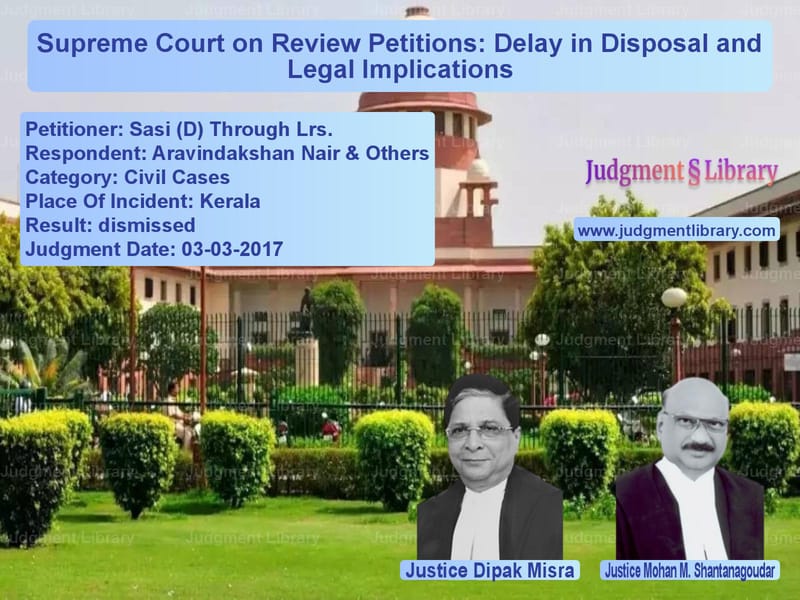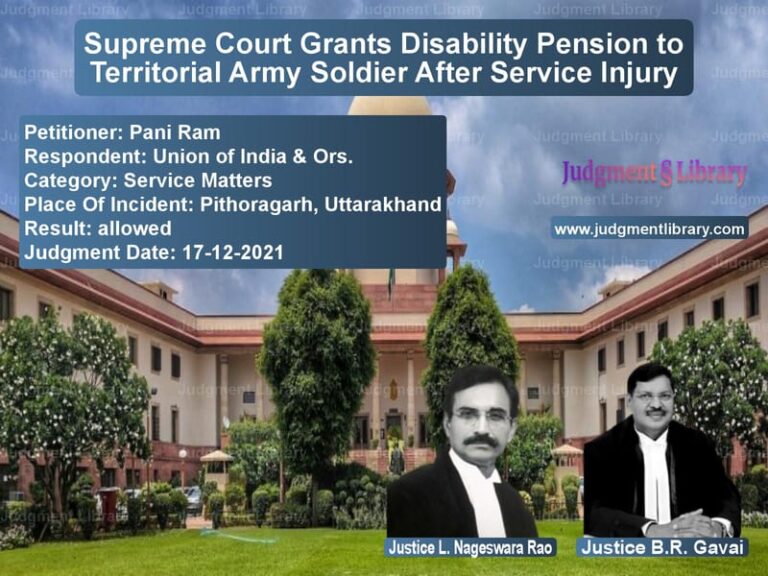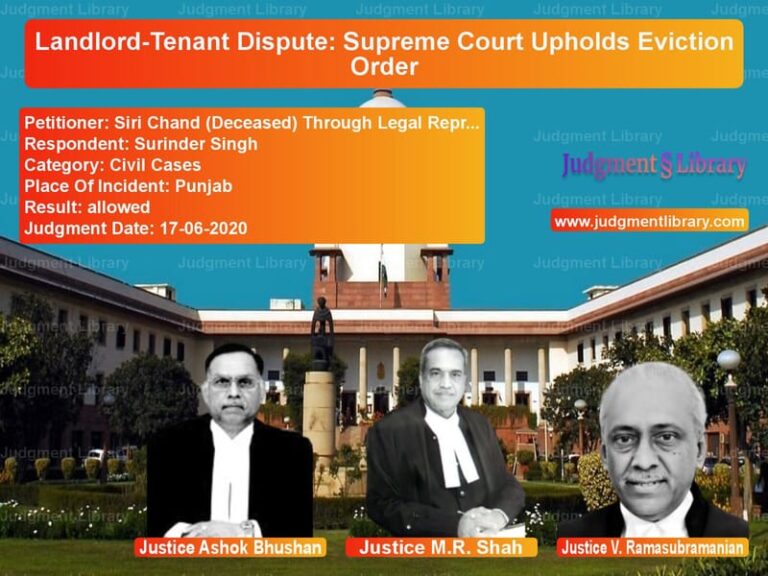Supreme Court on Review Petitions: Delay in Disposal and Legal Implications
The Supreme Court of India recently ruled on a crucial case concerning the prolonged delay in disposing of review petitions in Sasi (D) Through Lrs. vs. Aravindakshan Nair & Others. The case primarily addressed the legal principles governing review petitions and the inefficiencies that cause unwarranted delays in litigation. The Court took this opportunity to emphasize the importance of prompt judicial administration.
Background of the Case
The dispute originated from a Regular Second Appeal filed under Section 100 of the Code of Civil Procedure before the High Court of Kerala. The High Court dismissed the appeal on March 9, 2012. Subsequently, the petitioner filed a review petition under Order 47 Rule 1 of the CPC on September 20, 2012. However, the High Court kept the review petition pending for nearly four years and finally dismissed it on October 26, 2016.
The petitioner then approached the Supreme Court, challenging both the dismissal of the appeal and the review petition. However, the Supreme Court dismissed the Special Leave Petition on the grounds of delay and lack of merit.
Key Legal Issues
- Whether the High Court was justified in keeping the review petition pending for four years.
- Whether the principles governing review jurisdiction were followed in this case.
- Whether the delay in disposing of the review petition should be considered while assessing the condonation of delay in filing the Special Leave Petition.
Petitioner’s Arguments (Sasi Through Lrs.)
The petitioner argued:
- The delay in filing the Special Leave Petition (SLP) occurred due to the prolonged pendency of the review petition before the High Court.
- The High Court should not have taken four years to decide a review petition that had limited grounds for consideration.
- The delay in disposing of the review petition prejudiced the petitioner’s right to seek timely judicial remedy.
- The principles of natural justice demanded a reconsideration of the High Court’s judgment.
Respondents’ Arguments (Aravindakshan Nair & Others)
The respondents countered:
- The review petition was an attempt to reargue the case, which is not permissible under Order 47 Rule 1 of CPC.
- The petitioner failed to demonstrate any new evidence or error apparent on the face of the record, which are necessary conditions for granting a review.
- The delay in deciding the review petition cannot be a justification for filing the SLP with an extraordinary delay.
- The petitioner was trying to misuse the judicial process by prolonging litigation unnecessarily.
Supreme Court’s Observations
The Supreme Court examined the scope of review jurisdiction under Order 47 Rule 1 of CPC and the delays in disposal of review petitions. It emphasized that:
- A review petition should be disposed of as expeditiously as possible, given its limited scope.
- Allowing a review petition to remain pending for years creates an unnecessary backlog and impedes the judicial process.
- The responsibility of ensuring timely disposal of review petitions lies with both the judiciary and the parties involved.
The Court stated:
“An application for review, regard being had to its limited scope, has to be disposed of as expeditiously as possible. Though we do not intend to fix any time limit, it has to be the duty of the Registry of every High Court to place the matter before the concerned Judge/Bench so that the review application can be dealt with in quite promptitude.”
The Court also cited previous judgments on the principles governing review jurisdiction, including:
- Thungabhadra Industries Ltd. v. Govt. of A.P. (AIR 1964 SC 1372) – where the Court distinguished between a mere erroneous decision and an error apparent on the face of the record.
- Parison Devi v. Sumitri Devi ((1997) 8 SCC 715) – which held that an error must be self-evident and not require detailed reasoning to be corrected in a review.
The Supreme Court observed that the High Court, while dismissing the review petition, correctly held that the petitioner was attempting to seek an appeal rather than a genuine review.
Supreme Court’s Ruling
- The Special Leave Petition was dismissed on the grounds of delay and lack of merit.
- The Court directed High Courts to ensure that review petitions are disposed of promptly to avoid undue delays in litigation.
- The Supreme Court directed that a copy of its judgment be sent to all High Courts to ensure better case management of review petitions.
The Court concluded:
“We request the High Courts not to keep the applications for review pending as that is likely to delay the matter in every court and also embolden the likes of the petitioner to take a stand intelligently depicting the same in the application for condonation of delay.”
Impact of the Judgment
- Judicial Efficiency: The judgment reinforces the need for High Courts to efficiently manage review petitions and prevent unnecessary delays.
- Limited Scope of Review: It reiterates that review jurisdiction is not a second appeal but is meant only for correcting errors apparent on the face of the record.
- Litigation Discipline: The ruling discourages litigants from using review petitions as a delaying tactic.
Key Takeaways
- Review petitions should be decided promptly and not kept pending for years.
- High Courts must ensure that review applications are managed efficiently.
- Litigants cannot use review petitions as a means to indefinitely delay litigation.
- The Supreme Court’s directives emphasize judicial discipline and administrative responsibility.
Conclusion
The Supreme Court’s ruling in Sasi (D) Through Lrs. vs. Aravindakshan Nair & Others underscores the importance of timely disposal of review petitions and ensures that litigants do not misuse the judicial process to delay litigation indefinitely. The judgment serves as a reminder that review petitions have a limited purpose and must be handled with judicial efficiency to uphold the integrity of the legal system.
Don’t miss out on the full details! Download the complete judgment in PDF format below and gain valuable insights instantly!
Download Judgment: Sasi (D) Through Lrs vs Aravindakshan Nair & Supreme Court of India Judgment Dated 03-03-2017.pdf
Direct Downlaod Judgment: Direct downlaod this Judgment
See all petitions in Contract Disputes
See all petitions in Damages and Compensation
See all petitions in Specific Performance
See all petitions in Judgment by Dipak Misra
See all petitions in Judgment by Mohan M. Shantanagoudar
See all petitions in dismissed
See all petitions in supreme court of India judgments March 2017
See all petitions in 2017 judgments
See all posts in Civil Cases Category
See all allowed petitions in Civil Cases Category
See all Dismissed petitions in Civil Cases Category
See all partially allowed petitions in Civil Cases Category







